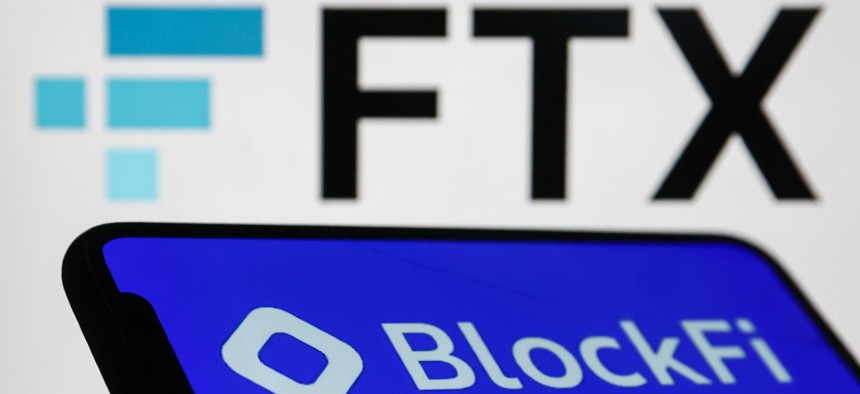Capitol Hill Presses Crypto Exchanges Post-FTX Bankruptcy

BlockFi logo displayed on a phone screen and FTX logo displayed on a laptop screen are seen in this illustration photo taken in Krakow, Poland on November 14, 2022. Photo by Jakub Porzycki/NurPhoto via Getty Images
Lawmakers launch probes into financial details of cryptocurrency exchanges as federal regulators stay quiet on FTX investigations.
The widespread fallout stemming from cryptocurrency exchange FTX’s bankruptcy reached Capitol Hill, with Sen. Ron Wyden, D-Ore., calling for answers from six other digital asset exchange companies on their consumer protection operations.
In six separate letters addressed to companies Binance, Bitfinex, Coinbase, Gemini, Kraken and KuCoin, Wyden’s questions focus on the safety of customer financial assets and how––or if––they are differentiated from investor financial assets within subsidiary companies, as well as corporate initiatives in place to prevent insolvency.
Wyden’s letter follows FTX’s bankruptcy declaration last week, a failure that cast a shadow of uncertainty over the future of many cryptocurrency exchanges given FTX’s widespread financial ties to other digital asset companies. Questions about FTX customers’ asset repayments reignited the push for increased regulations in the emerging asset space.
“As Congress considers much-needed regulations for the crypto industry, I will focus on the clear need for consumer protections along the lines of the assurances that have long existed for customers of banks, credit unions and securities brokers,” Wyden wrote. “If these protections had been in place before the failure of FTX, far fewer retail investors would be facing precipitous financial harm today.”
The questions, which are due back to Wyden’s office by Dec. 12, inquire into the exchanges’ safeguard to prevent the mixture of business and customer assets, debt-to-assets ratios and financial reserve information, audit histories, and customer disclosures.
Wyden’s inquiry follows increasing federal interest into FTX’s collapse and its potential aftermath. Fellow Sens. Elizabeth Warren, D-Mass., and Sheldon Whitehouse, D-R.I., also formally requested the Justice Department investigate the nature of the alleged mismanagement within FTX and the financial impact on investors.
The severity of FTX’s implosion was illustrated with fellow crypto exchange company BlockFi following suit in filing for bankruptcy. BlockFi also filed a complaint against Emergent Fidelity Technologies, a holding company owned by Sam Bankman-Fried, the founder and former chief executive of FTX.
BlockFi’s complaint seeks to recover collateral, specifically stock shares, from Emergent Fidelity Technologies.
Earlier in November, the SEC announced its proceedings against decentralized cryptocurrency organization American CryptoFed DAO over allegedly failing to disclose select business details with federal regulators.
U.S. Federal Financial Regulator and Chief Data Officer at the Government Blockchain Association, Mark Montoya, told Nextgov that federal regulators and law enforcement are privately working on investigating the causes of FTX’s bankruptcy and larger impacts to the digital asset marketplace.
“A lot of the regulators are looking at consumer protection right now, ensuring that the consumers are protected from this type of fallout with digital assets,” he said.
Representatives from the Department of Justice Department and Securities and Exchange Commission declined to comment on any intention to investigate.






